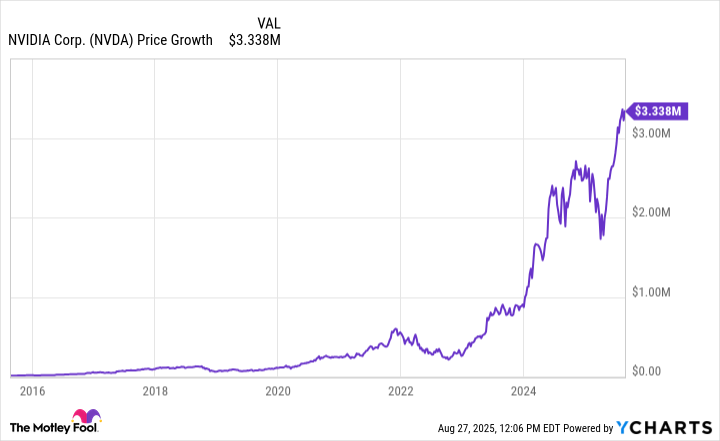With a nearly $4.5 trillion market cap, Nvidia (NVDA -3.38%) is the largest company in the world, and it has generated substantial returns for shareholders.
Viewed as the ultimate pick-and-shovel play powering the artificial intelligence wave, the company makes semiconductor chips that are designed to process multiple tasks simultaneously, making them ideal for AI.
Nvidia recently reported another round of strong earnings for its fiscal 2026 second quarter. The adjusted earnings per share of $1.05 and revenue of $46.74 billion both beat the Wall Street consensus. However, investors seemed disappointed that the company slightly missed revenue estimates in its data center division, although management indicated it is still seeing strong AI infrastructure demand.

Image source: Getty Images.
If you invested $10,000 in Nvidia a decade ago, here's how much you would have now
Betting on your vision of the future is the name of the game when it comes to investing in the stock market. Very few managed to see the potential of Nvidia and its graphics processing units to disrupt AI back in 2015. But those who were bullish on the company's prospects in the gaming or automotive industries have made a killing. In just 10 years, the stock is up about 33,280%, meaning if you invested $10,000 back then, you'd be a multimillionaire today.
Data by YCharts.
As you can see, Nvidia stock really took off in 2023 and hasn't looked back since. Consider that if you had invested in the benchmark S&P 500 index a decade ago, your $10,000 would be worth about $33,400. That's a very strong return for the broad market, but it still pales in comparison to the chip giant's performance.
Nvidia trades around 41 times forward earnings as of this writing. There's obviously debate over whether the company is overvalued, especially if the AI boom eventually slows down. But there are also plenty of stocks in the market that trade at much higher multiples with less growth, so investors are happy to pay the premium.






